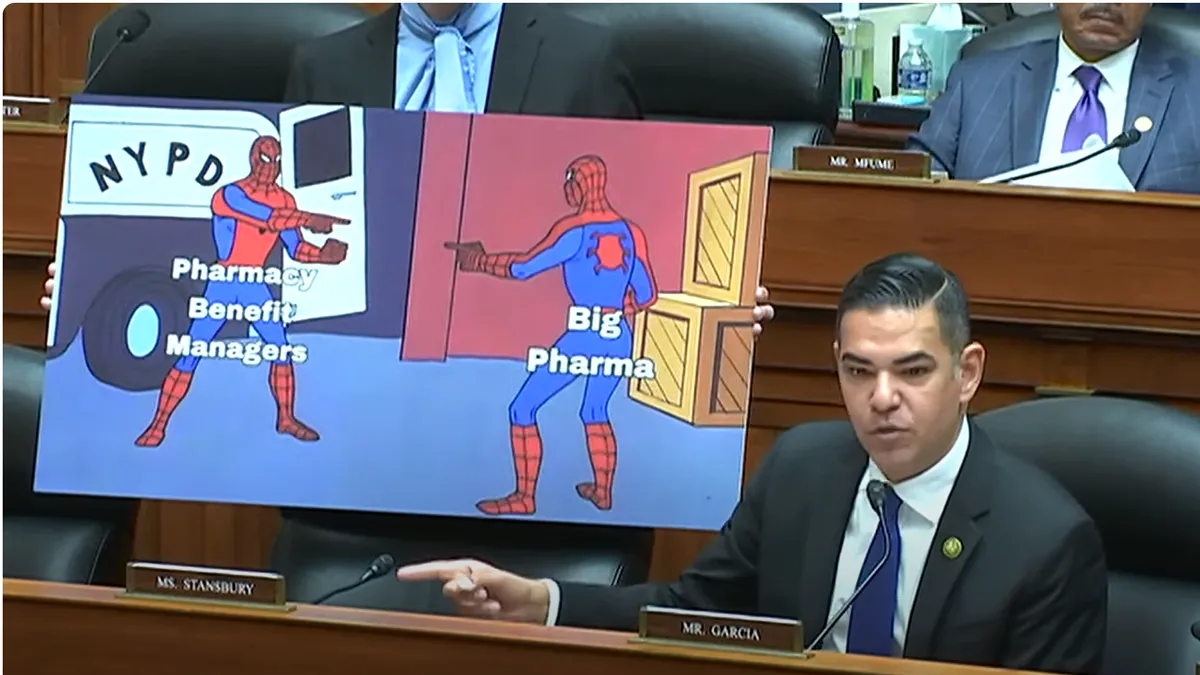Pharma executives and lobbyists have long sought to shift the blame for U.S. drug costs to the industry’s price-negotiating middlemen. Now, with the release of an FTC report this week pointing out the “enormous power and influence” these pharmacy benefit managers wield in the healthcare system, drugmakers might see some validation on that front.
In the ongoing FTC inquiry launched in 2022, the agency investigated the largest PBMs, three of which — CVS Caremark, Express Scripts and OptumRx — manage almost 80% of all U.S. prescriptions. Consolidation among these and three other PBMs amount to more than 90% of all prescriptions, squeezing local pharmacies out of business — along with vertical integration across the healthcare market, these practices contributed to higher drug costs, the FTC report concluded.
Executives like Eli Lilly CEO David Ricks have alluded in the past to PBMs’ role in drug costs. Called to testify in front of a Senate panel last year, Ricks said that while Lilly hadn’t raised the net price for the insulin product Humalog since 1996, adjusting for inflation, rising costs for consumers could be attributed to PBMs.
“Last year, about 80% of our insulin list prices went to paying fees and rebates to companies who didn’t invent, develop, manufacture nor study the medicine,” Ricks said at the May 2023 hearing.
In another Senate panel this year, Bristol Myers Squibb CEO Christopher Boerner also fired shots at PBMs for being the real catalyst behind Americans’ drug spend.
“Manufacturers give significant rebates, discounts and payments to intermediaries between us and patients in the pharmaceutical supply chain,” Boerner said, pointing out that BMS paid more than $96 billion to middlemen in five years. “But patients are not seeing the financial benefits of the sizable discounts because intermediaries are not required to pass on discounts to patients when they fill their prescriptions at the pharmacy counter.”
In response to the FTC report, other stakeholders like the National Community Pharmacists Association have also weighed in, saying PBMs need to be further regulated as they amass more power in the current system.
“In recent years, the pharmacy benefits space has undergone massive transportation,” said NCPA CEO B. Douglas Hoey in an email statement.
Practices employed by PBMs have led to consolidation, Hoey added.
“Without question — and as the interim report makes clear — the marketplace has exploded because of countless mergers and acquisitions as well as tactics like patient steering and take-it-or-leave-it contracting,” Hoey said.
Hoey called the current PBM system anti-consumer and anti-competitive, and for lawmakers to enact reforms that “level the playing field.” And members of Congress have been looking to do so.
One of the criticisms levied by the FTC is that “increased concentration may give the leading PBMs the leverage to enter into complex and opaque contractual relationships that may disadvantage smaller, unaffiliated pharmacies and the patients they serve.”
Senate Finance Committee Chair Ron Wyden (D-OR) and Sen. Mike Crapo (R-ID) have called for bipartisan reform to the PBM system “by advancing a comprehensive, consensus-driven suite of bills aimed at modernizing and improving prescription drug benefits.” These reforms include cost-cutting competition, better aligned incentives and increased transparency, according to a letter from the two senators.
PBMs fight back
The Pharmaceutical Care Management Association, a PBM lobbyist group, criticized the FTC report as flawed and unfair.
“Throughout this process, FTC leadership has shown that they have pre-determined conclusions that they want to advance irrespective of the facts or the data,” the PCMA wrote in an emailed statement. “Nothing can change the fact that PBMs are operating in an extremely competitive market and have a proven track record of reducing prescription drug costs, notably by promoting lower cost generics and biosimilars.”
The PCMA also highlighted FTC Commissioner Melissa Holyoak’s dissent to the interim report, which cited “process irregularities and concerns over the substance — or lack thereof — of the original order.” She said the report was politicized and designed to inflame ideological rifts.
“Most importantly, the report leaves us without a better understanding of the competition concerns surrounding PBMs or how consumers are impacted by PBM practices,” Holyoak wrote in her dissent.




















